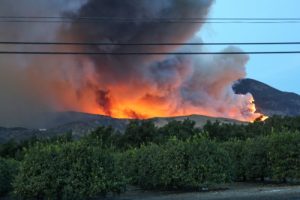
U.S. Rep. Paul Cook (R-CA) on May 8 cosponsored the Resilient Federal Forest Act of 2019, which would address the economic and environmental threats posed by extreme wildfires.
As an original cosponsor, Rep. Cook introduced H.R. 2607 with bill sponsor U.S. Rep. Bruce Westerman (R-AR) and 21 other members, including U.S. Reps. Glenn ‘GT’ Thompson (R-PA), Cathy McMorris Rodgers (R-WA), Dan Newhouse (R-WA), Greg Walden (R-OR) and U.S. Rep. Sanford Bishop, Jr. (D-GA).
“After last year’s horrific wildfires in California, it’s clear we need to do more to combat the threat of future wildfires and minimize the damage done to the environment,” Rep. Cook said following the May 9 “Wildfire Resilient Communities” hearing he attended as a member of the U.S. House Natural Resources Subcommittee on National Parks, Forests, and Public Lands.
According to the congressman’s staff, the 2018 wildfire season was the most destructive on record for his home state of California, resulting in at least $3.5 billion in damages.
“My vastly rural district is particularly susceptible to wildfires, which is why I cosponsored the Resilient Federal Forests Act,” said Rep. Cook last week. “The legislation implements common-sense reforms to ensure the long-term health of our forests.”
If enacted, H.R. 2607 would combine forest management reforms and streamlined regulatory processes to improve forest health and resiliency across the country, according to Rep. Cook.
Additionally, the bill would provide tools to federal land management agencies for increasing the pace, scale and cost efficiency of forest management projects while retaining environmental protections, he said.
H.R. 2607 is now under consideration by both the U.S. House Natural Resources Committee and the U.S. House Agriculture Committee.
“I look forward to working with Congressman Westerman to advocate for this bill as it moves through Congress,” said Rep. Cook.



